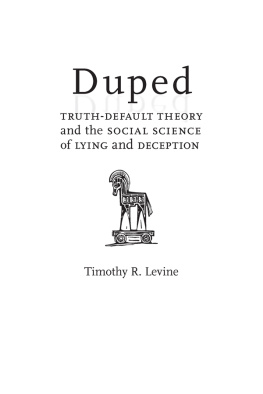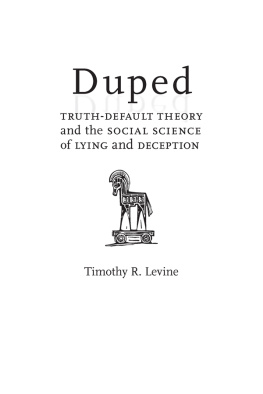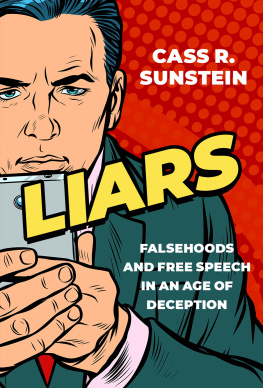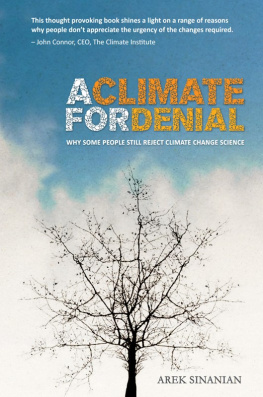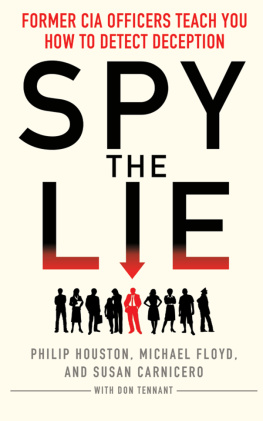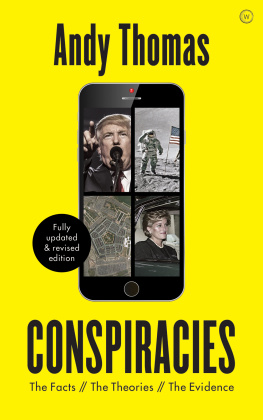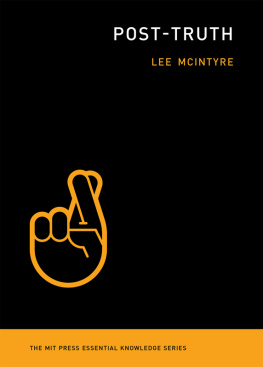Preface
DURING THE 2016 US PRESIDENTIAL election, fact-checking revealed that only one out of every six of the winning candidates statements was rated as honest or mostly honest. Yet fact-checking apparently held little sway with millions of voters who saw the candidate whose statements were more factually aligned as the less trustworthy of the two. How could this be? Despite the postelection soul searching of political pundits, this pattern is far from unique. Across a host of issues such as the advent of fake news, climate-science denial, and Bernie Madoffs appeal to investors, people can be astonishingly gullible. There are people who come off as authentic and sincere even when the facts discredit them. People fall victim to conspiracy theories and economic scams that should be dismissed as obviously ludicrous.
Many people, especially academics, see widespread gullibility as stemming from an unengaged and ill-informed public: If only people were better educated, surely they would be better at correctly distinguishing fact from fiction. Yet simple fact-checking coupled with public-education campaigns is unlikely to provide adequate solutions. Why? Because day in and day out, we spend our lives within a mind-set that can be characterized as a truth-default. We uncritically accept virtually all of the communication messages we receive as honest. Think about it: how many tweets, posts, articles, texts, e-mails, phone calls, and spoken declarative sentences do you receive each day? Now ask yourself: How many of those do you question in terms of honesty? Chances are, the answer is near zero. This is a near-universal human tendency. We all are perceptually blind to deception. We are hardwired to be duped. The question is, can anything be done to militate against our vulnerability to deception without further eroding the trust in people and social institutions that we so desperately need in civil society?
But there is a second critical point. Even though we have a strong tendency toward unquestioning belief, sometimes we do suspect deception. There are situations in which we abandon our truth-default. But, even when people are on guard for deception, folk wisdom about deception leads to predictable errorsin judgment. In the most recent presidential campaign, blurting out politically incorrect statements was understood by many Americans as evidence of authenticity. Appearing confident was interpreted as a sign of honesty. Alternatively, speaking like a politician with carefully chosen words signaled that the candidate was not to be trusted. Rather than questioning whether the candidates statements actually aligned with known facts, assessments of honesty and sincerity were based on the candidates demeanor. The problem is, demeanor is highly misleading. Appearing honest and being honest are usually unrelated.
My objectives here are ambitious and radical. I want to start a revolution. I seek to overthrow existing deception theory and provide a new, coherent, and data-consistent approach to understanding deception and deception detection. For more than twenty-five years, I have seen a need for a new theory of deception and deception detection. Ekmans idea of leakage was hugely influential, but the deficiencies were apparent almost immediately. His focus shifted over time from the leakage hierarchy to a focus on the face and microexpressions. But my read of the ensuing literature reveals more excuses for why the data do not seem to support his theory than solid, replicated, affirmative scientific support. Interpersonal deception theory is even less viable. It is logically incoherent, and I knew it to be empirically false four years before it was eventually published. The new cognitive load approach in criminal and legal psychology does not seem to be the path forward either, for the theoretical reasons identified by Steve McCornack, as well as weak, inconsistent, and just plain odd empirical findings. The need is clear. Existing theory does not cut it. A new perspective is needed.
Duped: Truth-Default Theory and the Social Science of Lying and Deception tells the story of my program of research culminating in my new theory of deception: truth-default theory (TDT). Approximately sixty original studies and experiments are summarized and woven together within the TDT framework. I detail where the ideas came from, how ideas were tested, and how the findings combine to produce a coherent new understanding of human deception and deception detection.
The story begins in 1989, when I coauthored my first deception detection experiment as a graduate student. The experiment brought college-student dating couples into the lab, and my professor and I looked at how the closeness of the communicators relationship and how prompting suspicion affected our research subjects ability to tell whether their partners were lying. The big finding was that even when we tried to make them highly suspicious, our subjects still tended to believe their partners regardless of their partners actualhonesty. This finding was called truth-bias, and it has turned out to be a very robust finding. Since then I have collected data in countries around the world and recruited a wide variety of research subjects, including college students, university professors, police detectives, customs agents, and professional spy catchers. Truth-bias has been a constant finding. I have never found people to be otherwise. Over time I have pieced together coherent understandings of truth-bias, how best to catch lies, and the interplay between the two.
TDT proposes that the content of incoming communication is usually uncritically accepted as true, and most of the time this is a good thing for us. One of the most surprising new insights is that truth-bias and truth-default work well for us. I argue that the tendency to believe others is an adaptive product of human evolution that enables efficient communication and social coordination. The truth-default allows humans to function socially. Further, because most deception is enacted by a few prolific liars, the so-called truth-bias is not really a bias after all. Passive belief makes us right most of the time. The catch is that it also makes us vulnerable to occasional deceit.
Importantly, TDT also challenges current social-scientific and folk views of deception that prioritize nonverbal and linguistic behavior as the keys to lie detection. According to TDT, the path to improved human lie detection involves listening to what is said, rather than to how it is said. As previously mentioned, the recent US election provides an excellent example of a situation where confidence and belligerence were decoded as authenticity and were often mistaken for honesty. More broadly, research shows that using evidence and skilled question asking produces much better outcomes than passive observation of deception cues like gaze aversion, facial expressions, body language, pronoun usage, or decontextualized counts of details.

